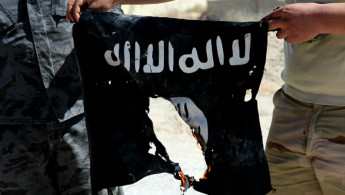Lebanon arrests suspected Islamic State group 'emir'
The Islamic State group's alleged top commander in Lebanon was arrested by Lebanese security forces in an overnight raid, local sources told The New Arab on Thursday.
Imad Yassin was found at his hideout at the Ain al-Hilweh Palestinian refugee camp, southeast of the port city of Sidon.
He had been monitored by the Lebanese intelligence services, who believe he was plotting a bomb attack on the southern governorate of Nabatieh, as well as another location in the Mount Lebanon governorate.
Yassin was accused of directing "operations targeting the Lebanese army" as well as "leading an armed group, communicating and coordinating with terrorists cells in Lebanon and Syria", according to arrest warrants issued against him.
He was also accused of masterminding a series of bombings that hit the Beirut suburbs between 2013 and 2014, security sources told The New Arab.
Yassin was first a member of al-Qaeda-linked Osbat al-Ansar militant group, where he held a leading position before breaking ties in 2003 to form Jund al-Islam.
He headed the militant group until 2013, when he pledged his allegiance to IS and sources say he became the militant group's emir in the refugee camp.
Ain al-Hilweh is famous for being a refuge to members of other militant groups.
The camp is also home to more than 54,000 registered Palestinian refugees, who were recently joined by thousands of Palestinians fleeing the conflict in Syria.
The Palestinian embassy in Beirut is expected to meet on Thursday to discuss the situation in the camp, The New Arab's Lebanon correspondent reported.
The capture of senior IS leaders serves a blow to the group, which has been on the retreat in Syria and Iraq, and has seen its presence severly diminished in places such as Libya.





 Follow the Middle East's top stories in English at The New Arab on Google News
Follow the Middle East's top stories in English at The New Arab on Google News
![The UAE is widely suspected of arming the RSF militia [Getty]](/sites/default/files/styles/image_330x185/public/2024-11/GettyImages-472529908.jpg?h=69f2b9d0&itok=Yauw3YTG)
![Netanyahu furiously denounced the ICC [Getty]](/sites/default/files/styles/image_330x185/public/2024-11/GettyImages-2169352575.jpg?h=199d8c1f&itok=-vRiruf5)
![Both Hamas and the Palestinian Authority welcomed the ICC arrest warrants [Getty]](/sites/default/files/styles/image_330x185/public/2024-11/GettyImages-2178351173.jpg?h=199d8c1f&itok=TV858iVg)